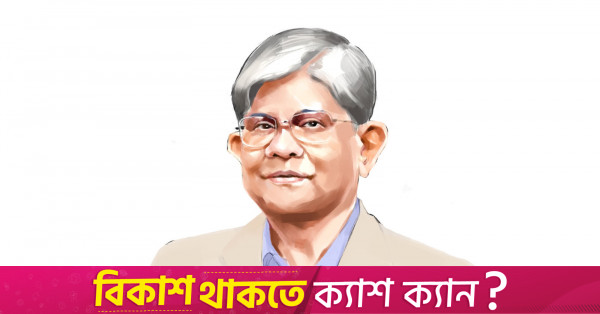The International Monetary Fund (IMF) now estimates that Bangladesh would need $35 billion to rebuild its crisis-ridden banking sector, almost double its initial projection, Finance Adviser Salehuddin Ahmed revealed today (26 July).
“The IMF earlier estimated the requirement at $18 billion. But after seeing the true extent of the crisis, they revised it to $35 billion,” he said while addressing the launch of Hossain Zillur Rahman’s latest book at the Cirdap auditorium in Dhaka.
Referring to the economic condition after the current government took office, Salehuddin described the state of affairs as a near-total collapse. “There’s no comparable case anywhere. 80% of bank funds had been looted. If outstanding loans total Tk20,000 crore, Tk16,000 crore is gone.”
In response to a journalist’s question, the adviser noted that the current budget earmarks between Tk20,000 crore and Tk50,000 crore for potential bank restructuring, depending on how the situation evolves.
There’s no comparable case anywhere. 80% of bank funds had been looted. If outstanding loans total Tk20,000 crore, Tk16,000 crore is gone.
Finance Adviser Salehuddin Ahmed
Adviser Salehuddin highlighted the institutional decay in the country. “The legal framework has been bypassed and systems have been destroyed. Even with sincere effort, it’s hard to fix anything. The same people remain in charge,” he said.
behind some positive footprints. That’s what we’re trying to do. The biggest obstacle to development is its concentration in cities – both our development philosophy and strategies are built around that.”
Responding to criticisms that the new government relies only on theory, he said, “That’s not true. We’re trying to apply our experience. But without political consensus, progress is impossible.”
As a former Bangladesh Bank governor, Salehuddin said it is difficult to ensure good governance in the existing context. “There are no checks and balances on the prime minister or MPs. Without reform at this level, technical fixes are futile.”
Salehuddin also expressed frustration with the private sector’s lack of preparation for Bangladesh’s graduation from LDC status. “Even after 50 years, many businesses remain like infants. We’ve told them to start preparing,” he said.
He added that people rightly expect returns when they pay taxes, noting, “Brazil collects up to 65% in income tax but provides facilities in return. We don’t have such structures.”
The newly launched book, titled “Orthoniti, Shashon O Khomota: Japito Jiboner Alekkho”, chronicles the country’s political economy from 2013 to 2025, exploring how governance, power and lived experience had intersected.
‘Economy, governance, power must work together’
Chairing the event, Hossain Zillur Rahman said meaningful progress in Bangladesh depends on the dynamic interaction between economy, governance and power.
“Economy is not an isolated sphere – it is fundamentally shaped by power and governance structures,” he said, arguing that Bangladesh’s potential is being constrained by authoritarian governance and top-down solutions.
“Japito Jibon”, he explained, refers to the everyday lives of ordinary people. “Lived experience reflects the realities of the masses. Yet, solutions have been crafted from an elitist, top-down perspective. Under autocratic rule, entrenched interests captured the state, bending governance to serve their own agenda.”
Institutional decay, rising inequality
Fahmida Khatun, executive director of the Centre for Policy Dialogue, said that without coordination between the economy, governance, and power, the public gains little from development.
“Politics, corruption, and official collusion have harmed the economy. Without accountability, political stability, and strong law enforcement, society cannot progress, which explains why 5–7% growth has been unsustainable,” she added.
Fahmida said development has ignored local needs, reflecting weak governance and concentrated power. The lack of competitive politics has weakened key institutions like the central bank, NBR, and ACC.
“Consequently, politically connected individuals default on loans with impunity, while ordinary farmers face jail. This bias fuels rising inequality, and unless it is addressed, sustainable development remains out of reach,” said the economist.
Calls for genuine reform, not just talk
Economist and political analyst Mahbub Ullah said if politicians fail to speak out and act against rising inequality, the country risks further instability.
“We never got the state promised by the Liberation War. It’s been snatched away through conspiracy and tactics. Let us not lose the aspirations of 2024 the same way.”
He called for a synthesis of trust and science to advance the state.
Political analyst Altaf Parvez said, “Fifty-five years on, we’re still saying the Liberation War’s dreams remain unfulfilled. Soon, we may say the same about 2024.”
He noted that while reform is widely discussed, little has been achieved. “Of 11 reform commissions, only five have sparked real debate. Every level – from the electoral system to district administration – needs reform.”
He said colonial-era structures remain deeply entrenched. “Police and local government reform are missing from discussions. Unless the prime minister’s godlike powers are reduced and local governance improved, expectations won’t be met. Decentralisation is essential.”
However, he acknowledged the challenge. “When it was proposed to take courts down to the upazila level, lawyers objected. If political parties can’t override such opposition, true reform is impossible.”
Values, not just reform, essential
Former ambassador M Humayun Kabir argued that becoming a true people’s republic required reducing the overconcentration of power in individuals.
“Reforms alone won’t work. We need value-based governance and countervailing forces,” he said, adding that Bangladesh must also navigate global challenges with supportive international partners.
Bhuiyan Asaduzzaman, research director at the Dhaka Institute of Research and Analytics, said, “Now, certain groups are placing greater emphasis on elections than reforms. But if the individuals and institutions involved in elections don’t play their proper role, democratic transition will fail.”








